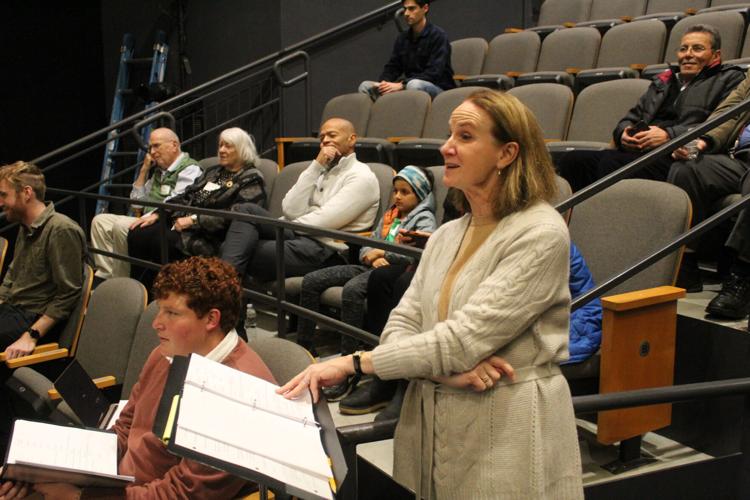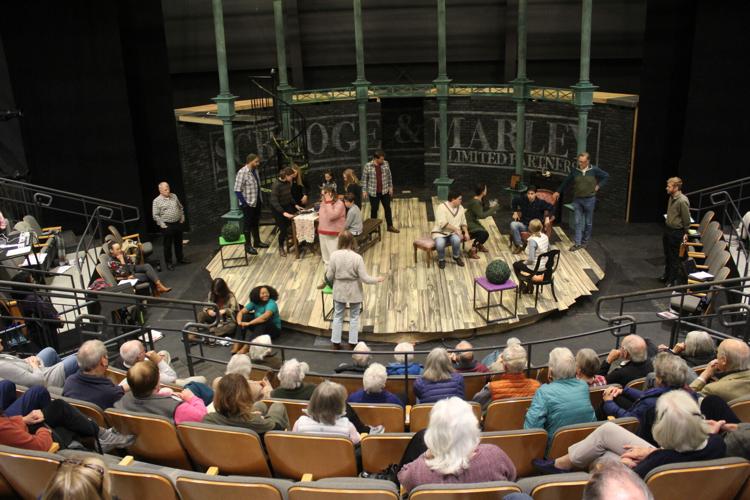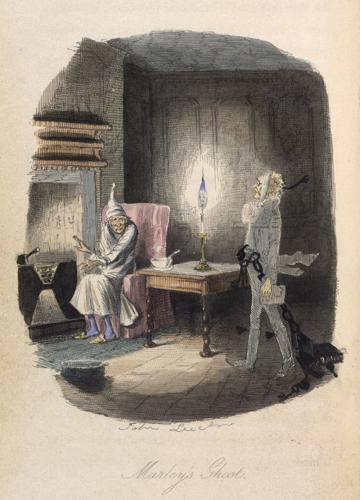When Carol Dunne, Northern Stage’s producing artistic director, decided she wanted to present Charles Dickens’ “A Christmas Carol” as the company’s annual holiday show, she knew she didn’t want any of the usual stage adaptations. So she decided to her create own.
“I see pictures, and they all look like Hallmark cards,” Dunne says. “Scrooge is not a funny guy. We’re really setting it in an industrial era. The gas was just turned on then. With these amazing things that the industrial revolution brought, Dickens was also saying, ‘Don’t leave the workers behind.’ So the story is told by the workers. It’s very true to Dickens.”
When Dunne suggested adapting “A Christmas Carol,” her staff told her not to, she was already too busy.
“So that made me do it,” Dunne says. “I got excited when I read it and started underlining all of these ideas and sentences that are more appropriate now than ever — that mankind doesn’t have forever to, once a year, treat others as they wish to be treated.
“We don’t have forever,” she says. “It feels like an exquisitely important time as we’re rebuilding community through theater that was decimated from the pandemic to tell a story for our community in a way that matters now.”
Northern Stage will present Charles Dickens’ “A Christmas Carol,” adapted and directed by Dunne, Nov. 21-Dec. 31 at the Barrette Center for the Arts in White River Junction. Holiday carols are interspersed throughout leading to the joyous community finale.
Dickens’ 1843 novella tells the story of the rich miser Ebenezer Scrooge who sees in his fellow man only the opportunity for profit. On Christmas Eve, he is offered a chance at redemption by visits from three ghosts — Christmas Past, Christmas Present and Christmas Yet to Come. What ensues is one of literature’s most poignant and beloved holiday tales.
Northern Stage’s cast of 30 features nine professional actors and 18 students of all ages from the Upper Valley. Scrooge will be played by local actor and playwright Jamie Horton, who played the title role in “King Lear” in 2019. Emmy-winning and Tony-nominated stage and screen actor Gordon Clapp, who most recently starred in the Broadway production of “To Kill a Mockingbird,” portrays the ghost of Scrooge’s deceased partner Jacob Marley.
In adapting “A Christmas Carol,” Dunne’s aim was to make it convincing to a contemporary family audience while remaining remain absolutely faithful to Dickens’ language and meaning.
“To be fair, probably 80% of it is in every adaptation in terms of the dialogue,” she said. “The dialogue is Dickens. I softened it a bit. Some of it is very obtuse, and I softened some of it so contemporary audiences would understand it, but you still hear Dickens.”
In particular, Dunne felt that the portrayals of the ghosts were critical to the drama’s power. Underscoring this, they are also being played by people Scrooge meets elsewhere — an idea Dunne doesn’t take credit for.
“It’s totally from ‘The Wizard of Oz,’” she said. “It’s totally that idea.”
The Ghost of Christmas Past is described as a combination of age and childhood innocence.
“That’s what our memories are,” Dunne said. “When thinking of myself as a child, I have the freshness of seeing the world as a child in one part of the memory, and I have the ancient idea of looking so long ago in my past that I feel very old when I think of myself as a child. So it’s that dichotomy.”
The Ghost of Christmas Present doubles as the orphanage matron.
“I visited the orphanage near Dickens’ home in London and saw how young people were treated was such a huge topic with him,” Dunne said.
Often the Ghost of Christmas Present is played as a character of food, drink and celebratory excess.
“Actually, in Dickens’ writing, he’s grown from the Earth — it’s grapes, it’s apples,” Dunne said. “Dickens wasn’t talking about having abundance, he was talking about living in the present: Be happy in the present with the beautiful simple things — eating a simple meal around a fire because that’s all you have.
“And frankly, at a time we’re dealing with environmental change, it’s more important than ever to celebrate,” Dunne said. “And so, we have doubled him as a gardener.”
The Ghost Christmas Yet to Come doubles as the lamplighter.
“He lights the lamps at the beginning but comes back because we are still reckoning with the incredible accomplishments of humanity, yet we’re in a time where we have to take greater care than ever about what our accomplishments are leading us to when you think about everything — AI, environment, war,” Dunne said.
Dunne’s adaptation focuses on what is important to her — and hopefully to the audience as well.
“I knew we wanted to recognize Scrooge as some of the people who have made so much money and think they have kept the reality of the world out,” she said. “But actually, they have isolated themselves from being human beings.”
Northern Stage didn’t have the money to develop the script in the traditional way, with outside readings and workshops. The readings were entirely in-house.
“Jamie Horton has been involved from the beginning, so the change had started with what I want to say my ‘kitchen cabinet,’ massive change,” Dunne said. “A whole new ending happened over the summer, really deepening who Scrooge is. We wanted to see how Scrooge didn’t really care his partner died and takes his house, the things that happen in the beginning.
“I’m very happy with where it’s going,” she said. “It feels right. It feels like all the ideas and the design are coming together in a very special way for me personally.
“The bones of the Dickens are perfect,” Dunne said. “I didn’t mess with it.”
Northern Stage Northern Stage presents Charles Dickens’ “A Christmas Carol” (with holiday music), adapted and directed by Carol Dunne, Nov. 21-Dec. 31 at the Barrette Center for the Arts, 74 Gates St. in White River Junction. Performances are: 7:30 p.m. Wednesdays-Fridays; 2 and 7:30 p.m. Saturdays (6:30 p.m. only Nov. 25 opening night); and 2 p.m. Sundays (except noon and 5 p.m. Dec. 24). Tickets are: for Nov. 21-24 previews, $34, $19 for students, $20 under 25; for remaining performances, $19-$68; call 802-296-7000, or go online to northernstage.org





